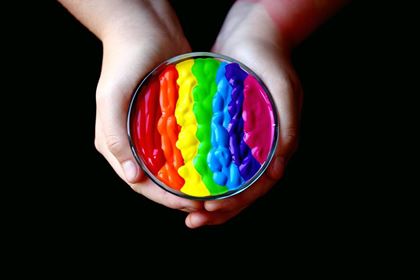I’m a self-published author of horror and I also review low-budget horror movies. Because I’m always ingesting new horror stories and watching the worst horror movies that Netflix has to offer, I know all too well how little members of the LGBTQIA community are included in these stories. In the 23 movies I’ve reviewed on my blog, not a single one contains an obvious non-binary character. And don’t even get me started on people of color. Movies aren’t the only victim, however. While it’s easier to find written LGBTQIA horror stories in today’s more accepting society, it’s still an issue and I want to do my part to remedy it.
To make sense of what I’m about to say, you have to learn a bit about me first. I was born into a religious family. We attended church every Sunday and I accepted it as fact that this was the only way life could be. I attended private high school, a private college, and was homeschooled for most of my elementary and middle school years. I went to church events, volunteered to help with Vacation Bible School, and read my Bible like it was the only book in the world. I wasn’t allowed to read Harry Potter or watch The Fairly OddParents on TV (thankfully my mom got over that and I’m now a proud Hufflepuff).
During my college years, I not only started re-evaluating my religious beliefs, but I also discovered the wonders of Nerdfighteria and the wild world of John and Hank Green. In 2017 I found a Facebook group called Adult Nerdfighters. Little did I know that this group would change my entire worldview and how I see people, religion, and myself. This group as well as another YouTube channel and some podcasts I’ll mention later, allowed me to learn about those in the LGBTQ community.
Let me preface the rest of this article by saying that I am a cishet white woman who is privileged but trying her best to learn and be taught. I don’t know what it’s like to have strangers challenge my identity in public and I can’t fathom not being able to hold my husband’s hand in public. I’m so sorry to those of you that do deal with that on a daily basis and I applaud your courage to stay confident in who you are despite all of that hate. I do know, however, that those on the LGBTQIA spectrum are normal people that are just wired differently.
In college I studied psychology, and I owe that natural curiosity about humans to my desire to learn more about a community I wasn’t introduced to until after I graduated. My family never talked about people who were different than us, so I always assumed gay people, trans people, non-binary people, etc. existed solely on television and were “disgusting” and “not natural.” I never felt comfortable calling another person those terrible things, so when I discovered a group filled to the brim with the people I assumed didn’t exist, I was thrilled. I made friends, I found common ground, and I realized, they were more like me than I was. Of course, this caused me to have a mental breakdown and question everything I had learned as a child. But that’s not what you’re reading this article to hear about.
October of 2017, I decided to start writing full-time. I went through several dead-end jobs, and after a failed YouTube channel, I decided to try my hand at writing. It was always something I wanted to do but never considered it a possible job avenue until I hit rock bottom and needed a creative outlet. I decided to write horror stories because, even as a young writer, I never gave my stories an ending. After an assignment to finish the cliffhanger ending of The Giver in high school, I knew I wasn’t crazy for leaving my readers hanging.
So, I started writing horror stories on a tiny WordPress blog. Then one day I realized that the reason people love stories so much is because they see pieces of themselves in those stories. They can relate to the characters in a way that makes the story immersive and therefore scarier where horror is concerned. I can only do so much on my end to make the story immersive for my readers, so it’s up to me to make characters they would connect with. I decided to play around with pronouns at first. My first experiment was a story written from the perspective of a dog. They have no sense of gender, so it makes sense that, in their mind, they would use “they/them” pronouns. Once that became comfortable, I started including stories about specifically LGBTQIA characters. I didn’t want to make their identity the center of the story, so I simply created characters that fit into the spectrum but acted as characters in a story that had nothing to do with their sexuality or gender. I don’t always write these characters into my story, but I really challenged myself to take more risks during Pride month of this year. For the entirety of that month, I wrote LGBTQIA characters into my stories and read them on my podcast. I think it made an impact, but I never get feedback on my stories, so I can only hope people follow me on twitter and download my episodes because they don’t hate me yet.
Some stories I’ve written include the tale of a lesbian couple that wins a mysterious storage unit in an auction, a bi man that takes out his frustrations on his cheating ex only to meet with his own punishment in the end, and a non-binary hospice nurse that learns an awful secret about one of their patients. My most recent story is about a trans non-binary character that’s been ostracized by their family and must cope with the loss of their grandmother, the only member of the family to show them kindness.
I’ve drawn inspiration from several resources and am in communication with members of the LGBTQIA community constantly. If I’m unsure of what a character might do or say, I ask my Nerdfighters or one of the many friends I’ve made in the LGBTQIA community on Twitter. Otherwise, I do my own research by listening to podcasts, watching YouTube videos, and talking with members of the community. Some of my favorite resources are:
- Conversations with People Who Hate Me, a podcast hosted by Dylan Marron (or Carlos from Welcome to Nightvale). Dylan often comes into contact with homophobic commenters on his YouTube videos and, in this podcast, calls those commenters and asks them why they said those things. It allows me to be exposed to healthy conversations with people that have differing opinions and helps me learn more about how I feel about certain topics they discuss on the podcast.
- The Blood Crow Stories Season 1: In the first season of this storytelling podcast, the main character is in a healthy polyamorous relationship with their partners and talks about it as a character in the podcast. However, it’s not a central theme of the podcasts plot and is a great example of what I try to do with my stories.
- Ash Hardell’s YouTube Channel: Ash is a non-binary YouTuber that identifies as genderqueer. They often make videos informing viewers about issues affecting the LGBTQIA community and it’s inspiring to learn from them. They even wrote a book detailing common words and phrases in the LGBTQIA community that I plan to buy in the near future to help me with future stories.
- Scott Heierman’s YouTube channel: Scott is a bearded drag queen comedian. He is not only hysterical, but shares life experiences about living his life going against the grain of the world. It’s inspiring to hear his stories and fascinating to experience life through his eyes.
I don’t want you to think I view those in the LGBTQIA community as a zoo animal caged and ready to be inspected at my leisure. These days I don’t associate as closely to the Christian values I learned as a child, and am trying to expand my worldview to include people I didn’t believe existed until about 4 years ago. I’m using the tools I’ve been given through podcasts, friends, and YouTube channels to make my mark on the world of horror and give people something to associate within a genre so overrun with white heterosexual characters. It might be a small mark, but it’s a mark nonetheless.

Please connect with us if you are seeking support or hoping to learn more about being part of a Supportive, Inclusive, Compassionate, and Kind community:
Join The MindReset!
Check out Events for support groups or live events:
- Follow The MindReset Facebook page
- Follow The MindReset Twitter
- Follow The MindReset Instagram
You are always welcome to connect directly with an individual from TMR at themindreset@gmail.com or (802) 377-MIND.


